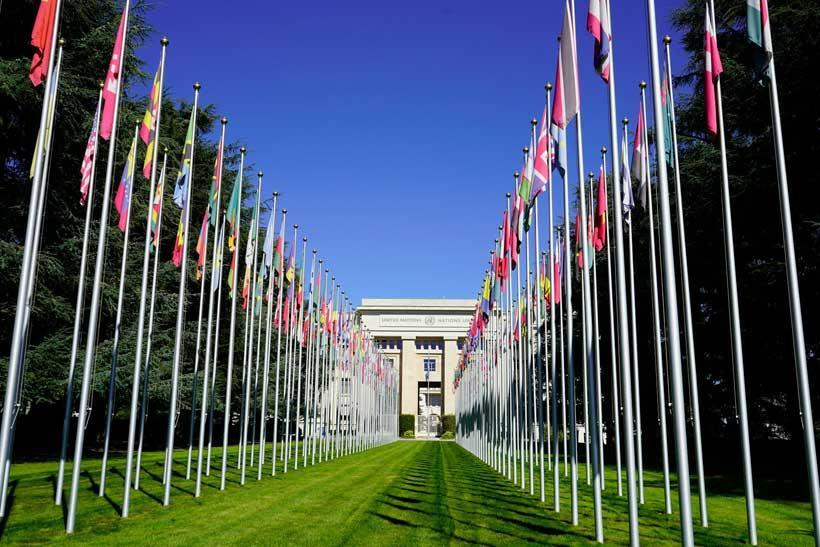By
Gerald Walker
Africa-Press – Mauritius. In an era marked by escalating geopolitical tensions, the world faces three major flashpoints that threaten global stability: the Israel-Iran conflict, the Russia-Ukraine war, and in a slightly smaller way, the China-Taiwan standoff. Each of these conflicts is rooted in complex historical, ideological, and strategic disputes, but they share a common truth: military escalation risks catastrophic consequences for all involved. Diplomacy, though often slow and imperfect, remains the most effective and sustainable avenue for de-escalation and resolution. By prioritizing dialogue, mutual concessions, and international cooperation, the global community can chart a course toward peace in these volatile regions.
The Israel-Iran conflict, characterized by proxy wars in Syria, Lebanon, Gaza, and Yemen, and mutual threats over Iran’s nuclear program, is a powder keg in the Middle East. Israel’s airstrikes on Iranian-backed targets and Iran’s support for groups like Hezbollah threaten the region’s stability.
Diplomacy offers a way out.
The 2015 Joint Comprehensive Plan of Action (JCPOA), though imperfect, demonstrated that negotiated agreements can curb Iran’s nuclear ambitions in exchange for sanctions relief. Reviving the JCPOA, or crafting a successor deal, could stabilize the region by addressing Israel’s security concerns while allowing Iran to reintegrate into the global economy. Regional dialogues, facilitated by neutral mediators like the UN or Qatar, could also reduce proxy conflicts by fostering agreements on de-escalation in Syria and Yemen. Such steps require Israel to temper its unilateral military actions and Iran to curb its support for militant groups – a goal that only diplomacy can achieve.
The current war could have been avoided. This direct Israel-Iran conflict will draw in the U.S., Saudi Arabia, and other powers, if diplomacy does not play a central role, destabilizing global energy markets and causing widespread suffering. Diplomacy, though arduous, is the only path to avoid this nightmare scenario.
The Russia-Ukraine war, now in its third year, has claimed countless lives, displaced millions, and disrupted global food and energy supplies. Russia’s annexation of Ukrainian territories and Ukraine’s fierce resistance, backed by Western arms, have created a stalemate with no clear military resolution.
For this, and many other reasons, diplomacy is the only viable exit.
A ceasefire agreement, mediated by neutral parties like Turkey or India for instance, would almost certainly halt the bloodshed and create space for negotiations on contentious issues like territorial control and Ukraine’s neutrality. While Ukraine’s aspiration to join NATO is understandable, a temporary moratorium on NATO expansion, paired with security guarantees from both the West and Russia, could satisfy Moscow’s concerns without abandoning Kyiv. Economic incentives, such as phased sanctions relief for Russia and reconstruction aid for Ukraine, would sweeten the deal.
Obviously, there are times when diplomacy rewards aggression, but with enough effort, this can avoided. After all, endless war serves no one so it is certainly worth trying. A negotiated peace would preserve Ukraine’s sovereignty while preventing further escalation that could draw NATO into direct conflict with a nuclear-armed Russia. The Minsk agreements, though flawed, showed that dialogue can yield progress. A renewed diplomatic push, grounded in pragmatism, is essential.
The ongoing tensions between China and Taiwan, fueled by Beijing’s claim over the island and Taipei’s growing alignment with the U.S., represent a ticking time bomb in the Indo-Pacific. China’s military exercises near Taiwan and the U.S.’s arms sales to the island have heightened the risk of miscalculation. A conflict here would disrupt global trade, given Taiwan’s role in semiconductor production, and could spiral into a U.S.-China war with devastating consequences.
Diplomacy is also the best tool to maintain stability.
The “One China” policy, under which the U.S. acknowledges, but does not endorse, Beijing’s claim to Taiwan, has preserved peace for decades. Reaffirming this framework, while encouraging cross-strait dialogue, could reduce tensions. Right now it is important to focus on confidence-building measures, such as agreements on military transparency or economic cooperation. International forums like the UN or ASEAN can and should facilitate talks, ensuring Taiwan’s voice is heard without provoking China.
And both sides will need to make concessions. China should scale back its military posturing, while Taiwan and the U.S. should avoid provocative actions like high-profile visits or explicit independence declarations. Economic interdependence between the two countries means a foundation for dialogue already exists. The breakout of war would only devastate both economies and risk a broader conflagration benefiting no one.
When applied to each of these conflicts, diplomacy is the only solution that has the ability to address the root causes, whether security fears, economic pressures, or historical grievances, without resorting to violence and warfare. In this regard, international cooperation is crucial. The UN, regional organizations, and neutral mediators need to work harder with both sides in each conflict to bridge divides, using economic incentives and sanctions to nudge the parties to the table.
There are pundits who dismiss diplomacy as weak or naive, but history proves its efficacy. The Camp David Accords resolved Egypt-Israel tensions, the Good Friday Agreement ended decades of violence in Northern Ireland, and the Dayton Accords halted the Bosnian War. These successes required patience, compromise, and trust-building – the very qualities needed today as well.
Diplomacy faces obstacles: domestic politics, where hardliners in Israel, Iran, Russia, Ukraine, China, and Taiwan resist compromise; mutual distrust; and the risk of spoilers who thrive on conflict. Yet these challenges are not insurmountable. Strong leadership, international pressure, and civil society advocacy can overcome resistance. Track II diplomacy can lay the groundwork for official negotiations.
The U.S., as a global leader, has a critical role. By championing diplomacy over militarism, Washington can signal to allies and adversaries alike that negotiation is the path forward. This requires consistency and coordination with partners like the EU, India, and Turkey.
The Israel-Iran conflict, Russia-Ukraine war, and China-Taiwan tensions can be resolved and diplomacy, though demanding, offers the best hope for resolution. In a world on edge, the stakes could not be higher.
moderndiplomacy
For More News And Analysis About Mauritius Follow Africa-Press







